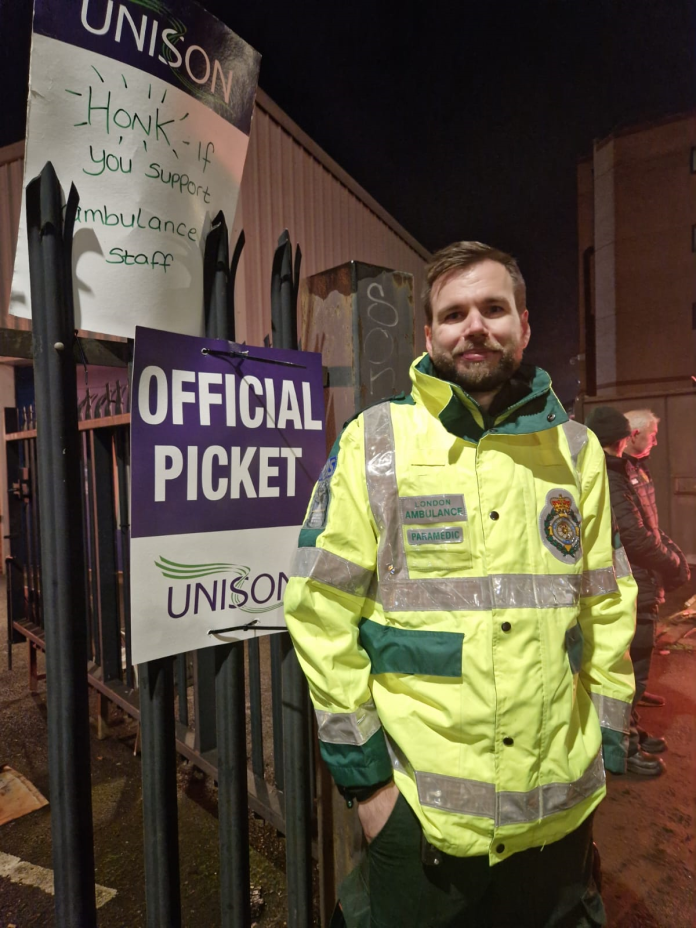Kevin Greenway, Bromsgrove Socialist Party
Bromsgrove in Worcestershire is often called a ‘Tory town’, as it’s elected Tory MPs for years. The reality is different. Strikes in recent months have shown that the working class is alive and well, and fighting to defend itself and our community.
Bromsgrove Socialist Party has been privileged to stand on picket lines with postal, health and now ambulance workers. All determined, all saying they’d never expected to be on strike like this, many for the first time.
Just like nurses, the ambulance workers, striking on 11 January, all stressed that they are there to fight for a safe service that is properly resourced. Some expressed confusion about what madness can be motivating the Tories.
They are used to madness though. The closure of ambulance stations across Worcestershire has left just two hubs: one in Bromsgrove in the north of the county, the other in Worcester. Bosses had wanted one hub, but unions fought that off.
Workers wore West Midlands Ambulance Service uniforms. Workers told me that the hubs and badge are effectively meaningless as shortages of ambulance and NHS staff mean crews are sent to areas such as Gloucester, Shrewsbury (a 100-mile round trip) and Bredon.
All of this carries higher risk. Longer-serving strikers look back to days when services were local, more immediate and safer.
The picket was lively, got massive support from passing traffic, and will be back on 23 January – and Socialist Party members will be there in support.
Pressures on workers mean there’s no choice but to fight
Steve Ion, Merseyside Socialist Party
On their second day of strike action, ambulance workers in Birkenhead, Merseyside, members of GMB and Unison unions, were determined and in good spirits. Support from the public was huge, with plenty of car horns and support from other unions. A delegation from the regional trade union council was also in attendance.
Concerns were raised that patients have been placed in corridors on arrival at hospital for a long time now. Strikers discussed the increase in patient numbers, as resources had not been put in place to give proper medical support prior to and during Covid; bed shortages in care homes, and staff shortages all round.
Workers on the picket line felt they sadly had no choice but to take strike action. They explained that it’s not just about pay, but the conditions and pressures ambulance workers are under: unable to take breaks, long shifts, and with newer staff unable to enhance their skills due to being stuck in ambulance queues for hours.
Many supported the call for coordinated action of all the unions involved, not only ambulance workers but all workers in the health service.
The current pay talks and government offers on pay were seen as totally inadequate, as workers have been suffering from 2% pay increases for years already.
Tory attacks cut no mustard with public
Tom Baldwin, Bristol Socialist Party
In Bristol there was torrential rain but the pickets carried on stoically throughout. Strikers described the latest planned anti-union laws as “repressive” and “an attempt to finish what Thatcher started”, adding that it fits with the Tories’ long-held opposition to the NHS and the principles on which it was founded.
It was clear from the way they attentively listened to every announcement on their radios that they were providing emergency cover anyway. The constant beeping of horns showed that attempts to demonise them in the press weren’t cutting any mustard with the public.
NHS strike dates
- RCN nurses are striking on 18-19 January and 6-7 February
- On 19 January, Unite members in the Welsh ambulance services will strike
- Ambulance workers in Unison and Unite will strike on 23 January
- Northern Ireland health workers in Nipsa, Unison and Unite unions are striking on 26 January
Read more articles on strikes in other sectors here:







